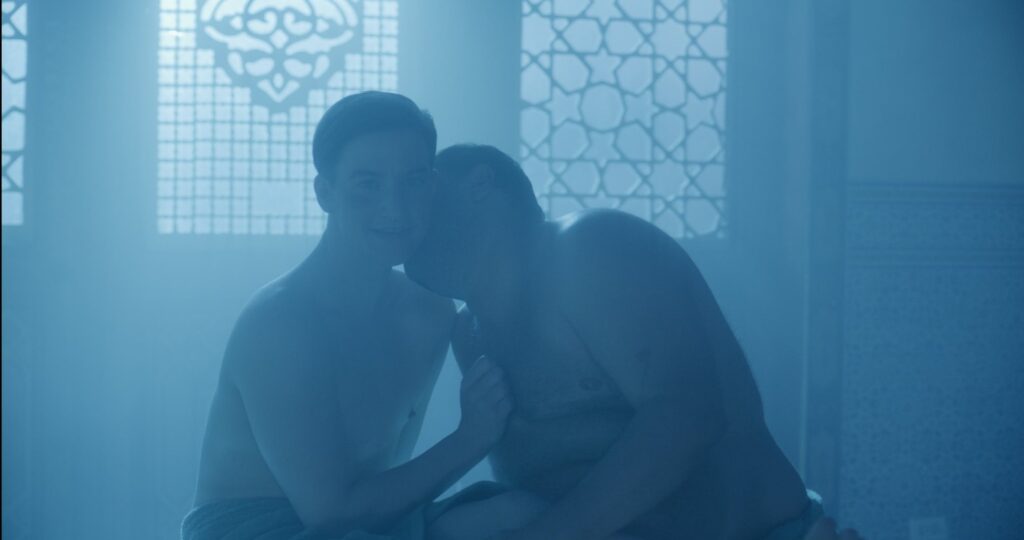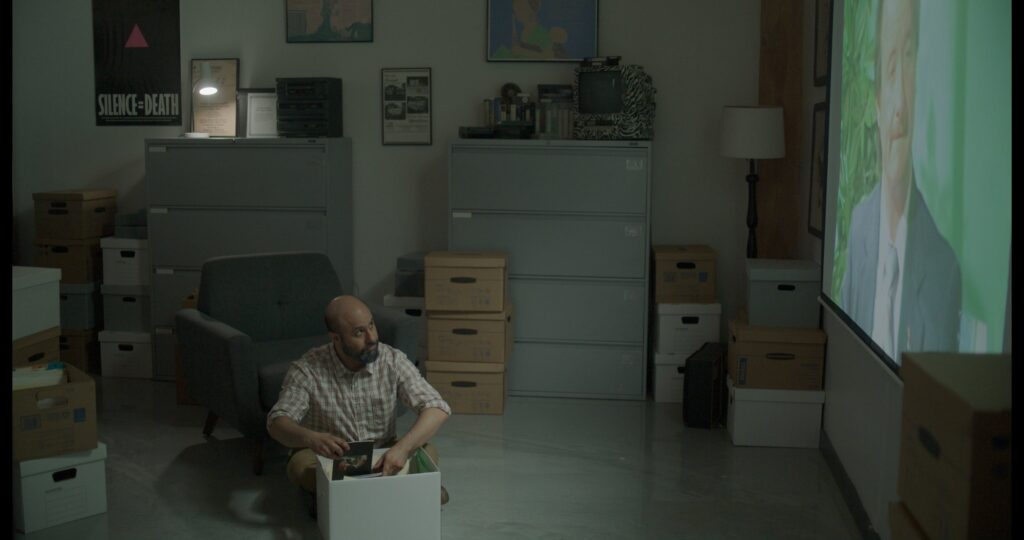Desire Lines: Traversing Transmasculine History Through Identity

Sitting in the movie theater surrounded by the local and vibrant queer community, chills swept over me from the unfolding narrative on the screen. “Desire Lines,” the new film directed by Jules Rosskam and starring Theo Germain and Aden Hakimi, is a bold and innovative exploration of transmasculine sexuality and history. The film’s unique premise of time travel through an LGBTQ+ archive is a powerful metaphor for delving into the layered and often hidden narratives of trans experiences. Through the protagonist’s journey, the film not only offers a personal quest for understanding but also serves as a broader commentary on the complexities and richness of queer history, challenging viewers to confront and engage with the nuances of the transgender experience.
Premiering at the Sundance Film Festival 2024, “Desire Lines” has garnered acclaim and attention for its thought-provoking narrative and compelling performances. Its continued presence in the festival circuit, including recent screenings at the TRANSlations Film Festival, a Seattle Trans Film Festival, underscores its relevance and impact within the LGBTQ+ community and beyond.
As audiences across diverse settings engage with the film’s themes and characters, “Desire Lines” remains a powerful testament to the importance of authentic representation and storytelling in fostering understanding and empathy.

Visually, “Desire Lines” is a masterpiece. The cinematography skillfully captures the ethereal and dream-like quality of the time-travel sequences, immersing the audience in a mesmerizing journey through space and time. Alongside the fantastical elements, the film also maintains a sense of intimacy. It pulls viewers into the protagonist’s internal world with poignancy. The direction of “Desire Lines” is a testament to Jules Rosskam’s imagination and groundedness. It balances the narrative’s surreal aspects and the characters’ authentic, lived experiences.
“Desire Lines” intricately weaves together past and present, leaving behind subtle yet profound traces of history throughout the film. Each scene in the past echoes into the present, leaving an imprint on the narrative. Take, for instance, the recurring motif of dripping water in the bathhouse scenes. This simple yet evocative element is a metaphor for the passage of time and the reminder of what has past. As the droplets fall, they symbolize the memories and stories of those who came before, subtly influencing the characters’ present-day journeys.
Similarly, the bathhouse itself becomes a symbol of continuity and connection across time. While it serves as a backdrop for the characters’ contemporary interactions, it also bears witness to the struggles and triumphs of those who frequented it in the past. The juxtaposition of past and present within the same physical space underscores the enduring legacy of queer history and the resilience of the community.

Beyond its visual allure, “Desire Lines” resonates deeply on thematic levels. The film not only underscores the importance of understanding and validating transmasculine identities but also advocates for increased visibility and representation of transmasculine men in media. Moreover, “Desire Lines” challenges traditional notions of belonging and acceptance, celebrating the diversity of queer experiences.
The performances of the transmasculine actors within the film are exceptional; they bring authenticity and emotional depth to their roles. Notably, Theo Germain’s Kieran and Aden Hakimi’s Ahmad showcase the nuanced approach to representation needed in a film like this. The portrayals emphasize respectful and supportive relationships that allow each character to navigate their identity at their own pace.
In a poignant exploration of queer spaces, “Desire Lines” challenges conventional perceptions of belonging and desire. Bathhouses, usually depicted as exclusive to cisgender individuals, take on a new significance in the film. Here, transmasculine people are not only present but also embraced and desired by other men. Here they reclaiming their right to both pleasure and intimacy. This portrayal disrupts the notion of inadequacy often associated with trans bodies in such spaces and offers a powerful affirmation of self-worth and acceptance within the LGBTQ+ community. By showcasing transmasculine people confidently navigating environments like bathhouses, the film dismantles cultural barriers to inclusion and belonging in order to celebrate the diversity of queer experiences and queer bodies.
At its core, “Desire Lines” is a remarkable work that captivates with its poignant storytelling while offering a profound glimpse into the history of transmasculine identities. Through the director’s meticulous research, “Desire Lines” illuminates the struggles of transmasculine individuals throughout history. The film looks to figures like Lou Sullivan, a pivotal figure in the transgender community, to intertwine past and present in order to create a sense of kinship and solidarity among viewers and our ancestry. In the movie Lou Sullivan saves his story from historical obscurity. His unwavering determination and courage in embracing his true identity resonates with the audience, particularly with transmasculine people who can see themselves reflected in his journey. His unwavering determination and courage in embracing his true identity resonate powerfully and allows his narrative to be a rich document of the social and cultural contexts in which Sullivan navigated. Finally, his story in the film offers invaluable insights into the larger transgender community’s fight for recognition and acceptance and sheds light on the struggles of the unnamed transmasculine people throughout history and offers invaluable insights into the larger transgender community’s fight for recognition and acceptance.
Films like this one offer more than just entertainment—they provide a space for catharsis. Through the film’s storytelling, the audience sees their own fears, anxieties, and joys on the screen and can explore the complex mix of emotions that comes with being part of the trans community in a safe and supportive environment. For that reason, “Desire Lines” left a profound impact on me. It was one of the first films that brought me to tears because of the overwhelming feeling of being celebrated and seen. This emotional response speaks to the power of authentic representation and the importance of films like “Desire Lines” in providing visibility and validation for marginalized communities. Seeing yourself in a movie, not only in a literal sense but also in characters who reflect your thoughts, your experiences, and your desires, is a powerful and validating experience. Representation matters, especially for marginalized communities like the trans community. Celebrating trans lives on the big screen is already rare, but witnessing such an astounding response to trans-masculinity was genuinely empowering to a degree I didn’t anticipate.
“Desire Lines” magnificently portrays the genuine experiences of transmasculine individuals and challenges societal norms with authenticity. Through candid interviews about sexuality, bodies, and queer dating, the film delves into intimate details that have seldom been explored on the big screen. This groundbreaking approach openly explores taboo topics such as trans and queer sexuality. Inviting transmasculine individuals to share their experiences breaks down barriers and normalizes discussions that have long been stigmatized, fostering a powerful connection and understanding among viewers.

For far too long, trans stories and experiences have been overlooked or misrepresented in mainstream media. The lack of diverse and authentic representation has left many feeling invisible and invalidated. But when a film captures the essence of trans lives, it becomes a beacon of hope and inspiration. Watching characters who echo our thoughts and emotions, have walked similar paths, and faced comparable challenges is indescribable. It reminds us that we are not alone in our journey. It affirms our existence and validates our identities. It tells us that our stories deserve to be heard and that our experiences matter.
The response to trans-masculinity portrayed on the screen was particularly impactful. It shattered stereotypes and misconceptions, presenting a multifaceted and nuanced portrayal of what it means to be a trans man. It showcased masculinity’s strength, resilience, and beauty in all its facets. The film was a grand celebration of the diverse expressions of manhood, breaking free from societal stereotypes and embracing a more inclusive definition of masculinity. Men from different walks of life came together to demonstrate their unique qualities and talents, each contributing to the vibrant tapestry of masculinity. The beauty of masculinity shone through countless ways as men embraced their passions and creativity. The portrayal of transmasculine sexuality in “Desire Lines” is raw and tender. It navigates the often uncharted waters of queer dating as a transgender man with sensitivity and authenticity. The encounters with the protagonist’s past and present selves are particularly poignant, offering a multi-dimensional perspective on identity formation and self-acceptance. “Desire Lines” is unlike any film experience you’ve ever had. It’s a compelling and thought-provoking journey that I highly recommend. Watching this film is not only an opportunity to support and validate your trans masculine friends and family, but it is also a chance to engage with a beautifully crafted story that challenges and enriches our understanding of identity, history, and love.
